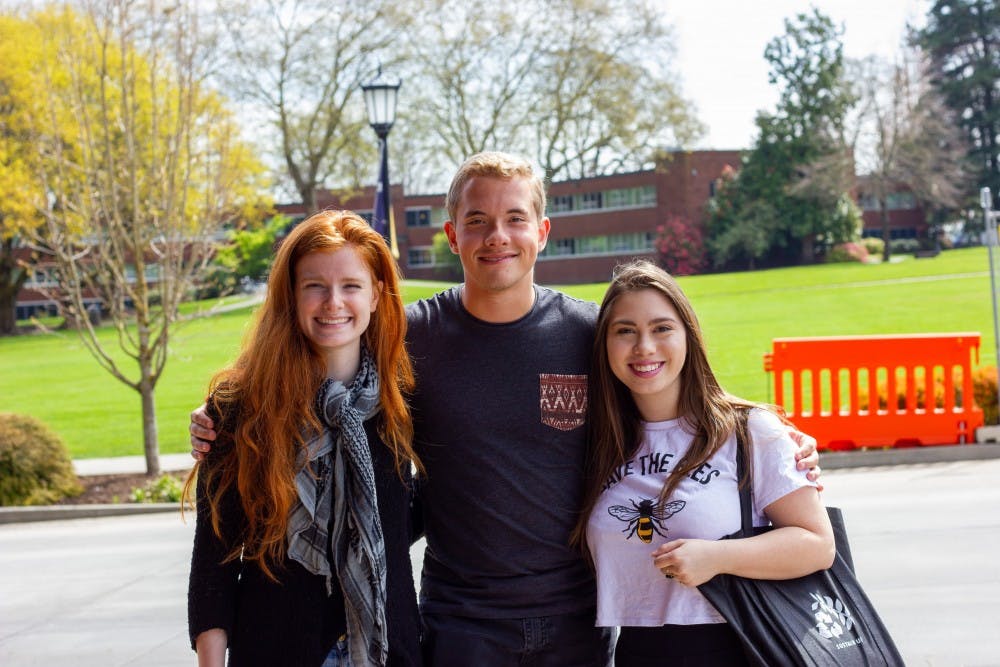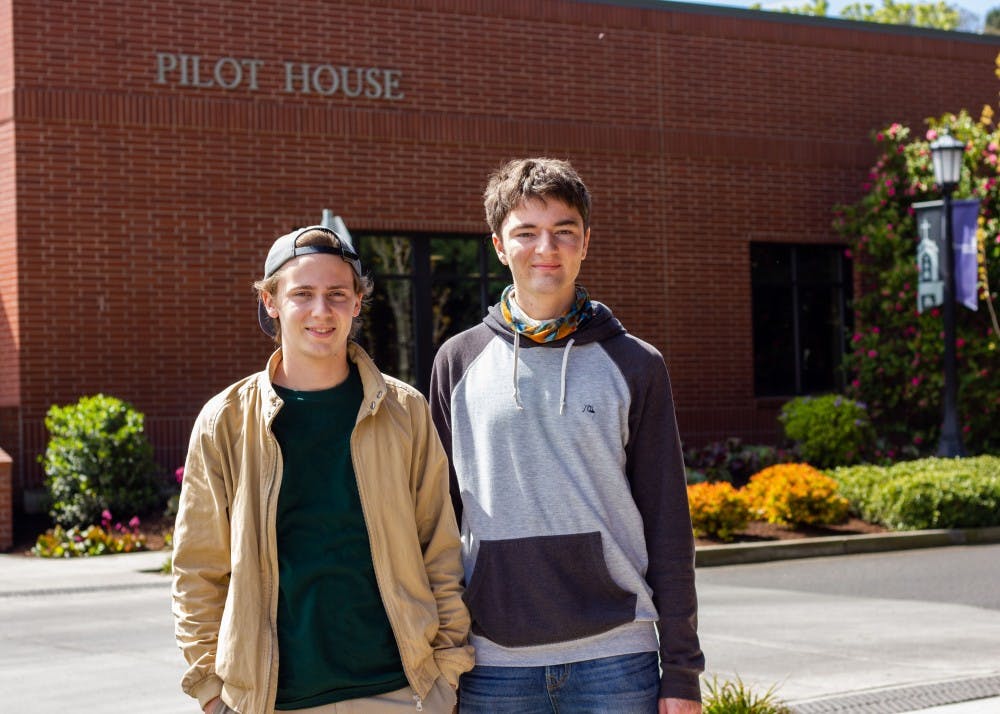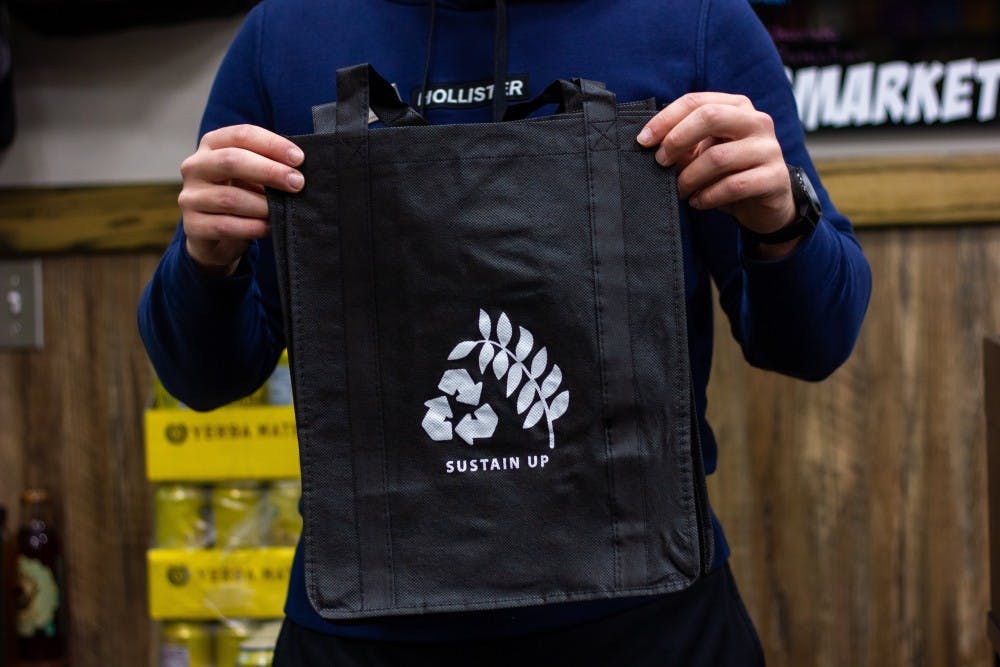If you’ve ventured into Mack’s Market in the past few weeks to satisfy your snack cravings, you may have seen the black tote bags hanging to the left of the register. After more than a semester of work, a group of Sustainability and Innovation Ambassadors have coordinated with Bon Appetit to bring reusable bags to Mack’s Market. Selling for 2.5 points, the initial shipment of 250 bags sold out within the month.
Rachel Hu, a sophomore marketing major and Sustainability and Innovation Ambassador (SIA) for Kenna Hall, proposed the idea in a one-credit course for SIA’s offered fall semester. The course, which was facilitated this year by professor Molly Hatfield, is a platform where ambassadors can propose and coordinate their initiatives for the year.
Hu felt that the paper bags offered by Mack’s were not only a flimsy choice in Portland weather, but also an unsustainable use of materials. Many grocery chains have introduced reusable tote bags to their shoppers, as single use paper bags are a drain on resources with a larger carbon footprint than one might expect.

Kira Champelli, Jacob Apenes and Rachel Hu are some of the students that were involved in the idea to create the bags.
“I showed up to class with my paper bag from Mack’s, and I was like, ‘We need a new system,’” Hu said. “This is not working.”
The class voted on the two best initiatives presented and chose the reusable bags project, as well as a project focused on monitoring water usage on campus. Ambassadors Rachel Hu, sophomore Mehling Hall ambassador Kira Champelli, junior Christie Hall ambassador Patrick Boldt, and junior Villa Maria ambassadors Liam Kearns and Jacob Apenes were assigned to the eco-bags project.
The group spent the duration of fall semester creating and editing an in-depth proposal to bring to Bon Appetit that outlined their timeline, potential pitfalls and reference points of support for the project. Their largest fear was that Bon Appetit wouldn’t be receptive to the idea, or that the bags would only be sold in the bookstore where they would reach fewer students.
Villa Maria ambassador Liam Kearns served as the primary liaison between the group and Kirk Mustain, the Bon App General Manager. Kearns described being utterly prepared to fight for their initiative, but Mustain was in full support of the idea after the initial pitch.
“When somebody’s willing to put in the work, I’m willing to help,” Mustain said of the project. “We’ve got a lot of things going on, but I think there’s always time for that. And I always applaud anybody who’s going to put some effort forward.”

Liam Kerns and Patrick Boldt were involved in the idea to create the bags.
After Hu created the simplistic design for the bags, Mustain ordered 250 that were stocked in Mack’s Market on March 18. Although the group hopes that the bags will make their way into every student’s hands, Mack’s Market will continue to offer paper bags as well.
“I’m really happy with it,” Kearns said. “It’s very rewarding to see because usually we do these projects and sometimes they either just kind of fall apart or they never really get finished. But this was a nice one to see. Now it’s actually in Mack’s, and I see people buying them.”
Because the project was so time-consuming, the group didn’t have the chance to implement one of their goals, which was a bag design contest. The contest would have served as extra promotion and engagement for the bags, and lend to a more unique design that the student body would be proud to sport.
“If we were to redesign it, we want to have it seem more Portland-esque,” Boldt said. “We want you to look at it and say, ‘Oh, that’s a Portland product. That’s a product of our university.’”
Since many SIA’s only take the position for one year, this group of students will not be working on the reusable bag program next year. Instead, they hope that whoever the incoming ambassadors are will take an interest in the project and pick up the baton.
After this shipment of bags has been depleted, the ambassadors hope that Bon Appetit will continue to periodically order more. In the future, they anticipate that the bags could become a permanent staple on campus similar to the eco-container program, another initiative that was born in the Sustainability and Innovation course.
“I think the people that want to do the right thing will buy a bag and remember to take it with them,” Mustain said.
Every member of the team described the sense of achievement they felt having a tangible product after months of hard work.
“I think the reason why the project this year was really good was not only was this a good idea, but the people that were on the team really wanted to work,” Apenes said. “That’s what you need out of ambassadors.”
Gabi DiPaulo is a reporter for The Beacon. She can be reached at dipaulo21@up.edu.








